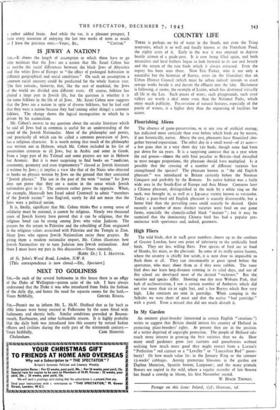IS JEWRY A NATION?
Sta,—It shows the length of assumption to which those have to go who maintain that the Jews are a nation that Mr. Israel Cohen has to ascribe the racial differences between the black Jews of Abyssinia and the white Jews of Europe to "the effect of prolonged habitation in different geographical and social conditions." On such an assumption a common racial ancestry could be predicated for the whole human race. The fact remains, however, that, like the rest of mankind, the Jews of the world are divided into different races. Of course, folklore has played a large part in Jewish life, but the question is whether it is the same folklore in the life of all Jews. Mr. Israel Cohen now suggests that the Jews are a nation in spite of diverse folldores, but he had said that they were a nation because they had (among other things) a common folklore. The change shows the logical incongruities to which he is driven by his nationalism.
Mr. Cohen's answer to my question about the secular literature which he said all Jews had in common is useful for an understanding of the mind of the Jewish Nationalist. Most of the philosophy and poetry, and practically all which can be called a common possession of Jews, has a religious character. It is worth noting that much of the philosophy was written not m Hebrew, which Mr. Cohen included in his list of possessions common to all Jews, but in Arabic and some in Greek. Even a large part of the Talmud and some prayers are not in Hebrew but Aramaic. But it is most surprising to find books on "medicine, astronomy, geometry and even trigonometry" classed as Jewish literature it written by Jews ; it implies a view like that of the Nazis who objected to books on physics written by Jews on the ground that they contained "Jewish physics." The use in the past of the term "nation" for Jews does not prove that they are a nation in the sense which Jewish nationalists give to it. The contexts rather prove the opposite. When, for example, Menassal ben Israel asked Cromwell to admit "members of the Jewish nation" into England, surely he did not mean that the Jews were a political nation.
It is, finally, significant /that Mr. Cohen thinks that a strong sense of solidarity must be national, it cannot be religious. Nearly two thousand years of Jewish history have proved that it can be religious, that the religious bond can be strong among Jews who value Judaism. The prayers for the return to Palestine and the rebuilding of Zion originated in the religious values associated with Palestine and the Temple in Zion. Many Jews who oppose Jewish Nationalism recite these prayers. By giving them a modern nationalist import, Mr. Cohen illustrates how Jewish Nationalists try to turn Judaism into Jewish nationalism. And there I must leave my part in this discussion.—Yours sincerely, (Rabbi Dr.) I. I. Marmot.
28 St. John's Wood Road, London, N.W. 8.
[This correspondence is now closed.—En., Spectator.]






























 Previous page
Previous page